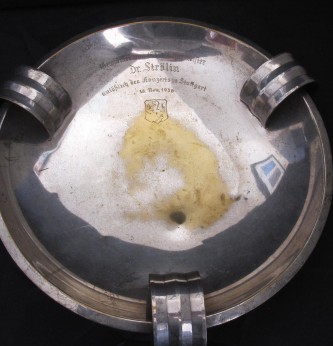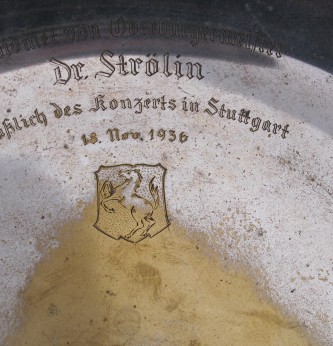Third Reich Presentation Bowl to Dr Strolin – Mayor of Stuttgart – Item 97151
Rare early presentation silver plated decorative bowl. Presented to Dr Strolin, Nazi Politician and Lord Mayor of Stuttgart from 1933-1945. Excellent sound condition with rearing horse of Stuttgart and inscription above to centre. This was given on 18.11.1936 for a concert by the London philharmonic orchestra in Stuttgart. The concert was being used by Nazi Propagandists who asked the conductor Beecham not to play the Scottish symphony of Mendelssohn, who was a Christian by faith but a Jew by birth.
Note: In 1931 Strolin stood as the NSDAP Candidate in Stuttgart’s mayoral election. Although he lost this with only receiving 26,000 votes to his oppositions 115,000. Never the less Strolin won in subsequent local elections and became chairman of the Nazi fraction. After the Nazis ceased of power on 30.1.1933 he was immediately given the post of Lord Mayor of Stuttgart. Within weeks he had dismissed hundreds of employees in the entire city government and replaced them with Nazi party members. Between 1941 and 1945 Strolin was responsible for the deportation of more than 2000 Jews from Stuttgart. As the war turned against Germany Strolin had contact with Leipzig Mayor Carl Goerdler who was involved in the 20 July plot to assassinate Hitler. Following the failure of the plot Strolin’s home was searched but nothing incriminating found. He was nevertheless discharged from leadership and remained Lord Mayor Stuttgart in name only. In April 1945 as French and American troops were advancing on Stuttgart Gauleiter Wilhem Murr called for the city to be defended at all costs. As a former Army officer Strolin new the city could not be defended in its valley location. As the city had already been heavily damaged by allied bombing raids. Through his personal intervention he prevented the demolition of the bridge over the River Necar. Over which the main water supply lines run into Stuttgart. Strolin then secretly contacted the French army and offered peaceful surrender of his home town. When Strolin’s contacts the the enemy were discovered an arrest warrant was issued. However, the radio operator who received the transmission did not pass on the message thus saving not only Strolin from the firing squad but the city from total destruction. Because Strolin was a prominent Nazi he was imprisoned by the allies in Camp 32 in Luxembourg. After his release he never expressed regret about his Nazi past.




